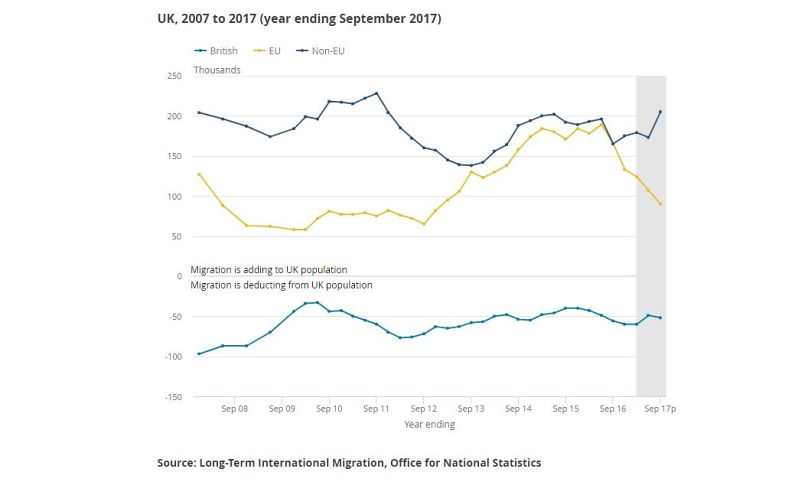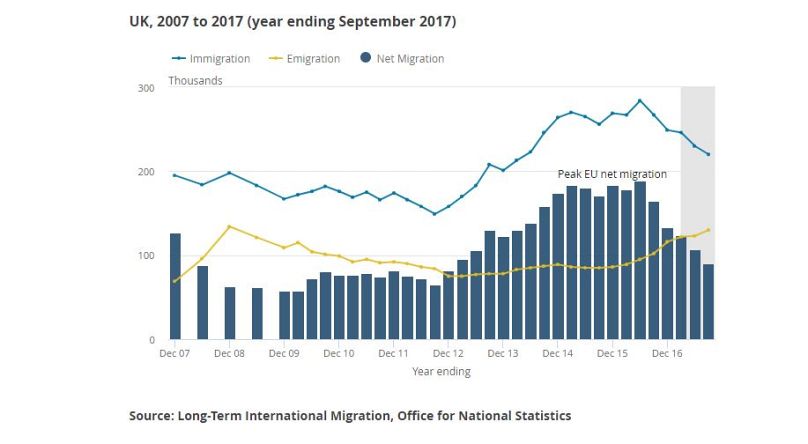New figures show net migration to the UK from EU countries continues to slide after the Brexit vote. But more people continue to come to Britain than leave.
More EU citizens are leaving the UK while the number arriving from Europe has fallen — continuing the pattern which began around the time of the EU referendum.
The number of EU citizens leaving the United Kingdom to return to their home countries rose to its highest level for nearly a decade in 2017. Meanwhile, the number moving to the UK from the European Union dropped to its lowest for over four years.
The UK’s Office for National Statistics (ONS), which published the figures for the year ending September 2017, stresses that more people are still coming to the UK — including from the EU — than are leaving, adding to the country’s population.
A gap has widened between EU and non-EU migrants. The year saw a sharp increase in net migration — the difference between those arriving and those leaving — from outside the European Union. After a period of around three years of relative level pegging, this outstripped net migration from EU countries by more than two to one.
“Brexit could well be a factor in people’s decision to move to or from the UK, but people’s decision to migrate is complicated and can be influenced by lots of different reasons,” said Nicola White, Head of International Migration Statistics at the ONS.
Net migration to the UK by citizenship
More people from the EU were still coming to live in the UK (220,000) than were leaving (130,000) in the year from September 2016, to give a net migration figure of 90,000. It’s the first time this figure has dropped below 100,000 in nearly five years.
The net migration figure from non-EU countries rose to 205,000 — it’s thought because of more people coming to study in the UK.
Fewer EU citizens came for “work-related reasons,” and in particular there was a sharp drop in the number coming to the UK “looking for work”. This more than halved over the year, continuing a fall which began over the previous 12 months, from 67,000 in September 2016 to only 33,000 in September 2017. In comparison, those arriving from the EU with a definite job saw only a small decrease.
EU long-term international migration
Overall, the net migration figure stood at 244,000 — a fall of 29,000 — levels similar to early 2014 following a peak over the next two years. However, this remains well above the target the British government has set since 2010: to cut net migration to below 100,000.
The figures add to signs that the decision by voters at the referendum in June 2016 to leave the EU has had a big impact.
“Taking back control” of the UK’s immigration policy — and rejecting the EU’s free movement rule — was one of the main reasons many Britons voted for Brexit.
The pro-Brexit newspaper The Daily Express welcomed the latest figures in its headline: “At last some good news on EU migration figures”. Other supporters of the UK’s split from the EU said immigration remained too high and the net figure was as large as the population of some major British cities.
However, some academics and industry groups disagreed.
Economics Professor Jonathan Portes of King’s College London tweeted to say the statistics showed “the UK has become significantly less attractive to European migrants: bad for the UK economy and for public services”.
“To compete, the UK needs to be somewhere that people want to come to work, and regrettably, increasingly it isn’t,” said Neil Carberry, managing director for people and infrastructure at the Confederation of British Industry (CBI).
The Institute of Directors said the figures compounded businesses’ concern about access to labour. Shortages have intensified since the Brexit vote on construction sites – especially from Eastern Europe – as well as in other sectors such as nursing and agriculture.
The manufacturers’ association the EEF said Britain needed to assure EU citizens they were welcome and needed. Prime Minister Theresa May said on Wednesday that she wanted all EU citizens living lawfully in Britain to stay after Brexit in 2019 and she promised a smooth registration system.













